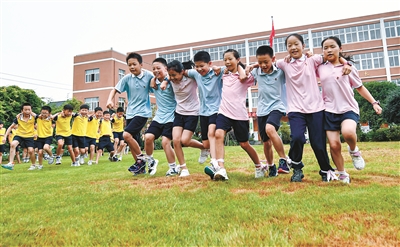
Primary school students in Yinzhou District participating in after-school activities. [Photo by Yan Long]
Chinese authorities have introduced a set of guidelines to ease the burden of excessive homework and off-campus tutoring for students in compulsory education (grade 1 to 9). Recently, the school hours of primary and secondary school students in Ningbo have increased, as have school-based after-hours programs. Providing students with a rich and varied curriculum during this increased time requires a concerted effort from schools, families, and society.
Volunteers Deliver
STEM Lectures
Over the past two weeks, since the start of the school year, more than 3,000 registered volunteers have been organizing programs in primary and secondary schools.
Recently, a team of volunteer instructors from the Ningbo Institute of Materials Technology and Engineering, Chinese Academy of Sciences (NIMTE) hosted a lecture at a school in Zhenhai District, where engineer Zhang Haiqing unveiled the mystery of 3D printing. After an explanation of the principle of 3D printers and hands-on creation of 3D printed parts, the students gained a lot of new scientific knowledge.
"Today's lesson was very interesting. The teacher brought a 3D printer, and it was so much fun to print things out," one student said happily.
In the future, the NIMTE team will continue to organize extra-curricular activities in coding, Lego education, model building, robotics, drones, natural sciences, and other STEM (science, technology, engineering, math) subjects relevant to the institute's and the researchers' own fields of expertise.
"To make it easier for elementary school students to understand the content, I carefully prepared my lessons in advance. This semester, I will also talk about drones and underwater ROVs to cultivate their interest in science from a young age," Zhang said.
Another school in Ningbo now schedules cooking classes every Thursday afternoon, inviting parents to teach the students culinary skills. The class is very popular with students, many of whom expressed a willingness to keep a journal of their learning progress.
'Unconditional Rest
Time Vouchers' Grant
Teachers Time Off
As elementary schools roll out more after-school programs and junior high schools open up their classrooms for evening and weekend study hall, teachers' working hours have inevitably become longer. To reduce teachers' workload and stress, a pilot school in Zhenhai District is issuing "unconditional rest time vouchers".
To get a half-day break, teachers only need to submit the voucher with a form stating their name, department, planned time off, and other basic information.
Each month, the school issues two "unconditional rest time vouchers" to each junior high teacher and one to each elementary teacher. The process is relatively simple: after getting the administration's approval, teachers can freely switch classes among themselves or request the administration to coordinate the scheduling.
Many teachers welcome the "unconditional rest time vouchers". "If there is a family emergency or if you are tired, it's good to have half a day off," one teacher said.
In the school principal's view, giving teachers time off will help them be more focused and efficient in the classroom, which in turn benefits student growth.
Youth Palace Quality
Programs in Great Demand
On weekends, Ningbo Youth Palace is crowded with children attending extracurricular programs and their accompanying parents.
"My child likes painting and public speaking. Now that he doesn't have to go to extra academic classes over the weekends, he has more time to participate in activities that interest him," a parent said.
Recently, the Youth Palace opened many new extracurricular programs and camps in arts and sports, which are very popular.
Many children are eager to sign up for programs at the "Junior Academy of Science", a creative space of the Ningbo Youth Palace. Elementary school student Guo Guo has a strong interest in engineering and electrical circuits. He can put together all kinds of devices under the guidance of teachers; at home, he even has his own "creative workbench" where he works independently.
Meanwhile, the Ningbo Cultural Study Camp organizes trips for kids to visit key cultural monuments around the city and experience traditional local crafts, increasing their knowledge and understanding of Ningbo culture while enhancing their independence and teamwork skills.
To address the shortage of after-school education in rural areas, the Youth Palace also works with rural schools to bring more programs to students there, so that they could have access to an equally-diverse range of activities as urban children.
By Dong Na


